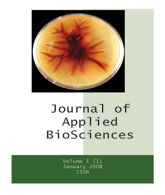Journal of Applied Biosciences (J. Appl. Biosci.) [ISSN 1997 - 5902]
Volume 49: 3371 - 3382. Published January 29, 2012.
Biochemical characterization of the lipase activities in dormant seeds from the ripe and unripe Terminalia catappaLinn (Myrtales: Combretaceae) fruits harvested in Côte d’Ivoire
Thierry Yapo MONNET1, Pamphile Kouadio Bony KOFFI1, Yadé René SORO2, Edmond Ahipo DUÉ1, Lucien Patrice KOUAMÉ1*
1 Laboratoire de Biocatalyse et des Bioprocédés de l’Université d’Abobo-Adjamé (Abidjan, Côte d’Ivoire), 02 BP 801 Abidjan 02, Côte d’Ivoire.
2 Laboratoire de Biotechnologie de l’Université de Cocody (Abidjan, Côte d’Ivoire), 02 BP 22 BP 582 Abidjan 22, Côte d’Ivoire.
ABSTRACT
Objectives: The aim of this study was to check some biochemical properties of the lipase activities in dormant seeds from the ripe (LASRF) and unripe (LASUF) Terminalia catappafruits harvested in Côte d’Ivoire.
Methodology and Results: Fresh fruits (ripe and unripe) of Terminalia catappawere carefully cracked and the seeds were removed, cleaned and washed off any adhering residue. The crude enzyme extracts isolated contained active lipases. LASRF was higher than LASUF. They showed lower affinity for medium with long C-chain esters than for short C-chain triglycerides especially coconut oil. The optimum conditions for lipolysis of LASRF and LASUF was found to be 45°C and 45 min incubation time, with a pH optimum near neutrality (pH 5). Optimum substrate concentration was 5 g in 2.5 ml of hexane. LASRF and LASUF were stable at temperatures between 30-37°C for 100 min. Calcium ion enhanced the enzymes responsible for LASRF and LASUF, while Mn2+, Na+, K+, Fe3+, Fe2+, Zn2+ and EDTA strongly inhibited the same activities.
Conclusions and application of findings: The results of the present study showed that the oil of Terminalia catappa (tropical almond) seed will deteriorate with storage. The enzyme activities appear to be distinct from other known lipase activities in terms of substrate specificity, stability and chemical agent effect. The thermostable, lipid-hydrolyzing enzymes may be applied to treat lipid-rich industrial effluents, to produce inter-esterification substances in the food industry, or to synthesize useful chemical compounds. Stability of LASRF and LASUF in the presence of hexane makes it a good candidate for application in non-aqueous biocatalysts.
Keywords: lipase activity, seed, Terminalia catappa, fruit.
FULL PAPER [PDF AVAILABLE HERE]
